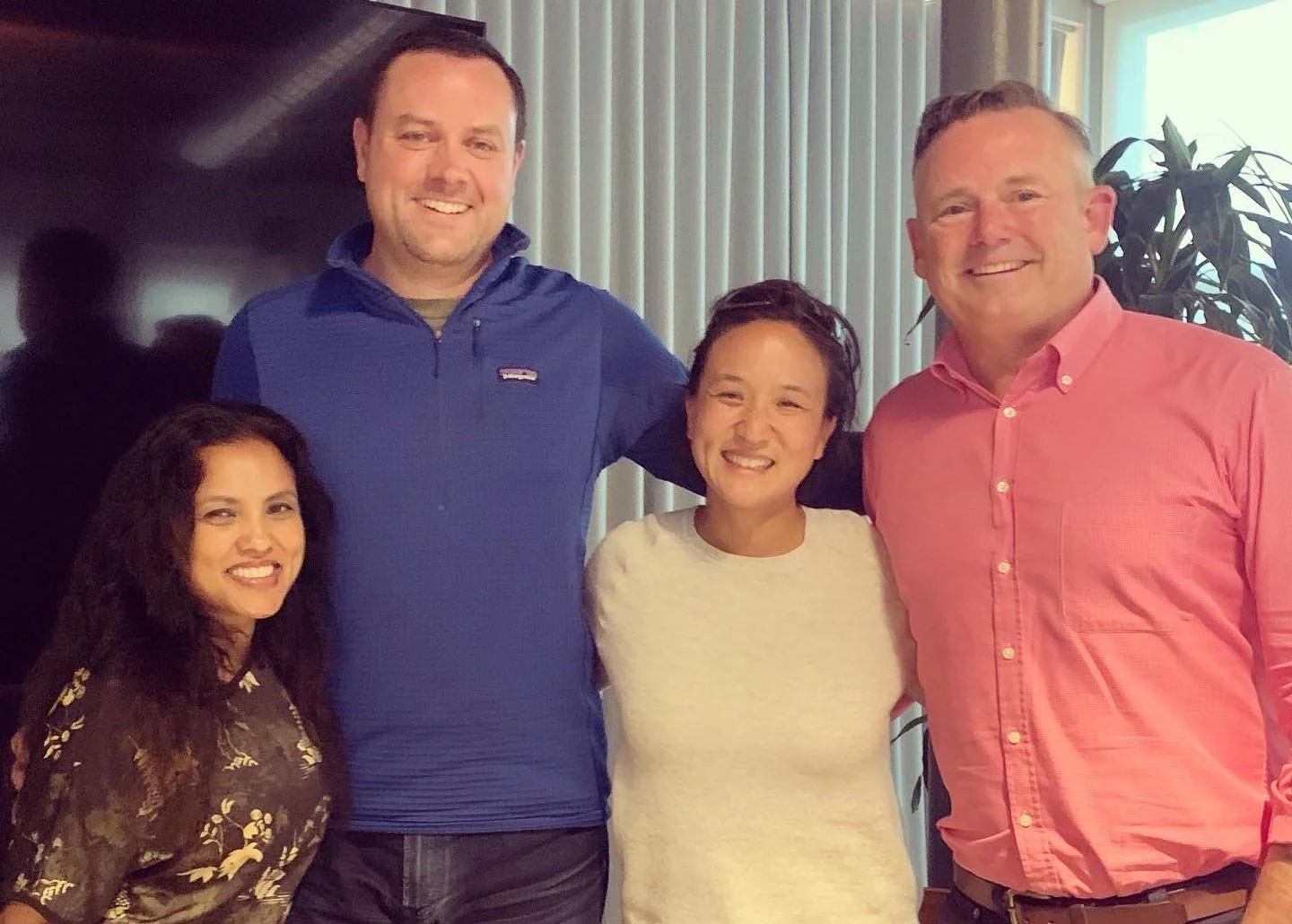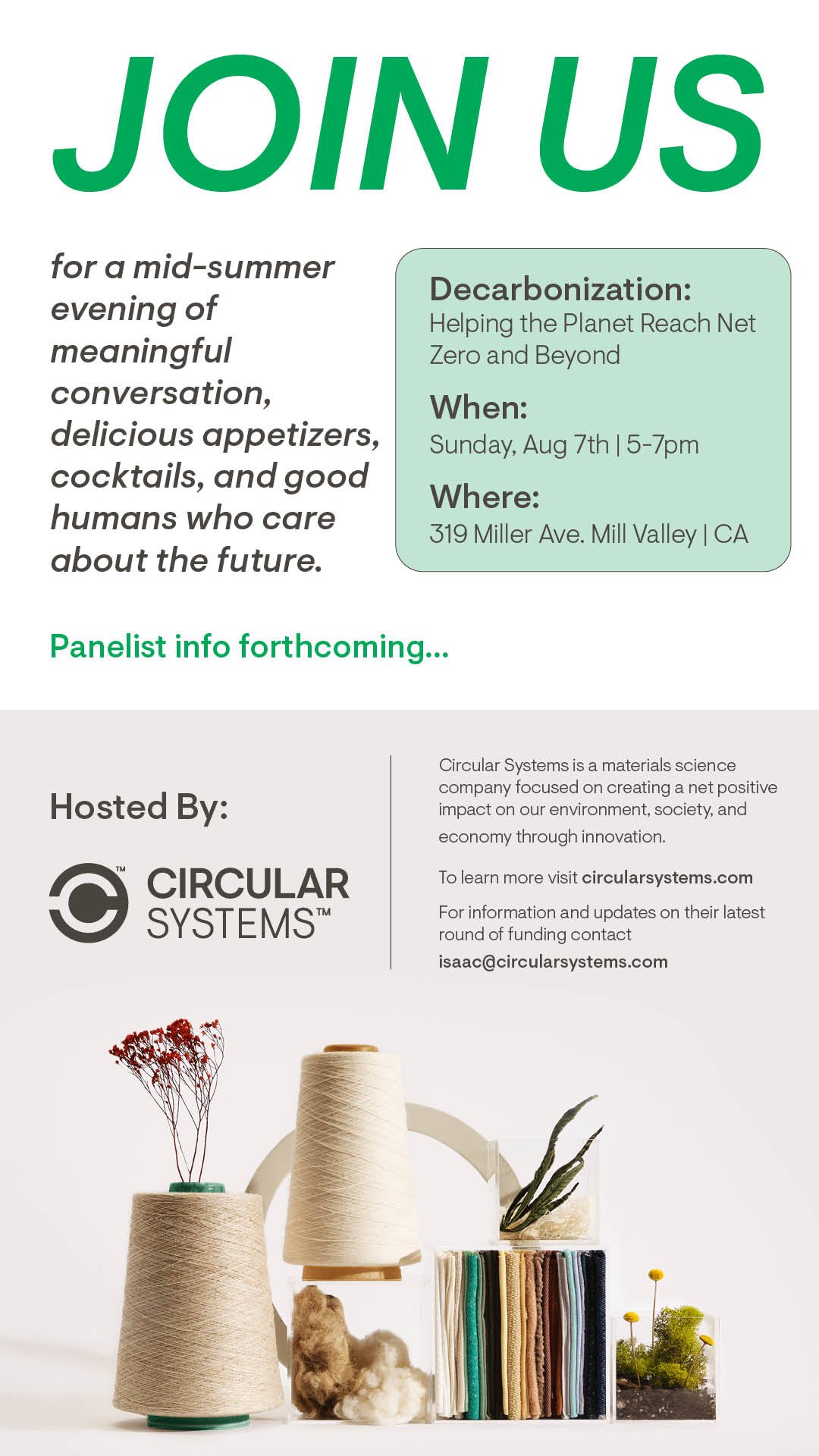Climate Change and the Pathway to Decarbonization
August 7th, 2022
At Circular Systems, we're not just working to minimize the negative environmental impacts of the fashion industry. Together with the impact investment community, we want to harness the power of innovation, systems thinking, and regenerative practices that start to heal the damage that has been done to our planet. Together we can build reciprocal production systems that decarbonize and help us all to hit critical science-based targets and GHG reduction goals.
We recently brought together thought leaders for a discussion on “Climate Change and the Pathway to Decarbonization”, for a long overdue meeting in person with our growing community of innovators, hosted by Circular Systems. The panel was moderated by Scott Leonard, Chief Sustainability Officer at Circular Systems.
We invited Pae Wu, General Partner at SOSV, and Jeff Johnson, Managing Director at Temasek, to share their insights on the pathway to decarbonization. The combined funds oversee $300B + in capital and are the most active investors in Climate Tech on the planet. Yet even with that pool of funding, not close to enough investors are focused on solving the problem of climate change.
Climate Tech investors play one of the most essential roles in our future on this planet. They identify opportunities, innovations, and technologies that will create a low-carbon or decarbonized economy and energy sources that produce low levels of greenhouse gas emissions that are the cause of observed climate change.
Here are some highlights from the session on where we as a community of entrepreneurs and investors can focus:
The mindset shift that needs to take place to hit decarbonization goals will be to be symmetric across all mass markets, and thus the more quickly we reach cost parity with innovation, the better chances we have. Right now, we are failing, but Jeff Johnson pointed out that we need to acknowledge our successes and build on them. “Take a moment and celebrate some of the successes of work of Circular Systems and other folks out there in the fashion industry focusing on this challenge,” says Johnson.
In order to convert radical ideas into practice, we need to understand that things take time. Factories have to be built that require their own technological development. We have to really understand, and learn how to manage and scale innovations. “This takes patience”, says Pae.
It also takes “Radical Collaboration”, says Jeff. Many people look down on big companies, but they are often the key to driving radical innovation, along with the participation of startups and government. Everyone needs to work together on a hyper-local and national level. There is less than a decade left in our carbon budget. The time is now for solutions and the building of new infrastructure.
Smart money means for investors and innovators to align on values, understand the context and business, and move forward with purposeful and thoughtful ways to invest and scale what we truly need.
“We are not here to decarbonize our fund; we are here to decarbonize the world," Jeff says. Even though Temasek owns Singapore Airlines, smart money means investing money into a business that may currently have a huge carbon footprint and finding ways to improve that.
“If you’re a tourist in deep tech, as an investor, you will have misunderstandings on the timelines to scale, and by pushing faster, you will create perverse incentives that lead to bad outcomes,” says Pae. Make sure that you have strong alignment between the investors, customers, team and mission.
Carbon markets are necessary but not sufficient; they are helpful but not the answer and only add to the small piece of the big puzzle. It is one of many business models that can help. “We have to figure out other solutions.”
The big levers to pull are in food and ag, where SOSV has made a lot of investments. Yet, “I like to look at the really unsexy sectors that are critical to our continued lifestyle”, Pae says. Concrete for construction and building is terrible for the environment. An example of a recent investment by SOSV is Minus Materials. Providing more green solutions that are also affordable is necessary. Customers will only buy if it is cheaper and better.
The leading question is, “How do we replace exactly what we have?” Jeff asks. Substitution is critical so that businesses are not entirely disrupted. For example, a building using cross-laminated timber instead of steel.
Pae says, “Behavior change is a great lever, but it is also a slow, and a very western-centric perspective”. There is an emerging middle class in Asia that is excited about eating meat on a daily basis. We know that meat carries substantial carbon impact, so we need to address this at scale globally.
The priority is changing very difficult/old industries by creating the same products, at the same price but maybe even a bit better. We have to be realistic; for instance, mining won’t end as long as we want everything on our phones.
We need to align on One Metric on what to do with emissions. It’s a hard problem to solve because we know that oil and gas will go away, but do we still invest in trying to improve those sectors and extend their lifetimes? Or do we focus on something completely new?
There’s lots of excitement about technology-based carbon removal, but it’s also hard to scale and expensive. Technology does not always solve everything.
As operators, owners, consumers, and entrepreneurs, we can bring more mindfulness to our daily lives. We can learn about what we eat and pay attention to what we consume and buy. We have to learn how to connect with people where they are and engage with them on a journey they can get interested in and fully understand. This responsibility lies with us all. We must continue to support the founders and invest in their solutions that are going to make a difference.
Circular Systems would like to thank Guayaki Yerba Mate for drinks, with a special thanks to Karana Foods and Prime Roots for serving delicious jackfruit dumplings and a koji charcuterie board. If you want to join the Climate Tech movement, be sure to check out SOSV’s Climate Tech Summit in October.
Circular Systems (CS) is proud to bring such an amazing group of people together for this discussion. Circular Systems is a materials innovation company focused on cleaning up the fashion industry globally and headquartered in California. Circular Systems customers are high visibility fashion brands that look to CS for authentic impact and sustainability credentials. Circular Systems is a leader in fashion impact and sustainability standards. The Company is raising $10M+ in a series A with an attractive convertible note available now.














